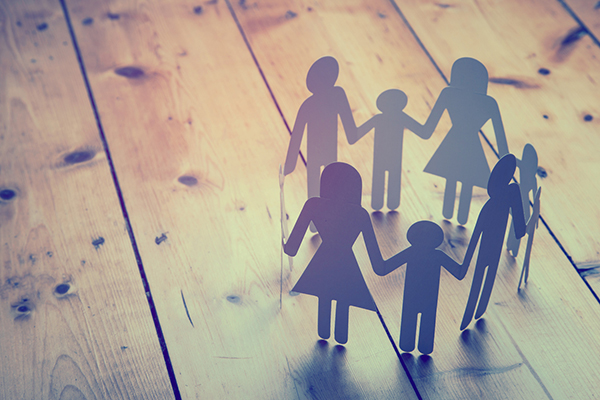FOCUS ON…

Dealing with Bereavement with Children
In this edition around BEREAVEMENT, we’ll look at:
- Understanding loss and grief – why can losing a family member, friend or loved one have such an impact on children?
- How do children grieve? What might this look like for your child? How might children respond to a bereavement?
- Helping your child to cope with loss – what can you do to best support your child during this difficult time?
- Activities to promote healing – some fun, interactive and supportive ways to help your child manage their grief.
- Resources and Signposts – where to look for help, advice and guidance.
 UNDERSTANDING LOSS AND GRIEF
UNDERSTANDING LOSS AND GRIEF
Losing a loved one or someone close to you can be a very difficult experience for both adults and children. It’s important to understand that children grieve differently than adults, and they may need your help to navigate their emotions.
Losing a loved one can have a profound impact on a child’s emotional and psychological well-being for several reasons, including:
- A disrupted sense of security: Children rely on their loved ones for a sense of security and safety. The loss of a loved one can shatter this sense of security, leaving them feeling vulnerable and uncertain about the future.
- Difficulty understanding death: Children may struggle to comprehend the concept of death and its permanence. This can lead to confusion, fear and anxiety.
- Emotional overload: Grief can be overwhelming for children, leading to intense emotions like sadness, anger and guilt. They may find it difficult to process these feelings and express them healthily.
- An impact on Social and Emotional Development: The loss of a loved one can disrupt a child’s social and emotional development. They may withdraw from social interactions, struggle to form new relationships or have difficulty managing their emotions.
Experiencing loss at a young age can also have long-term effects as the impact of bereavement on a child can extend into adulthood. Children who experience loss may be at increased risk for mental health problems, such as depression, anxiety and substance abuse- if the right support and coping strategies are not put into place quickly and effectively.
 HOW DO CHILDREN GRIEVE?
HOW DO CHILDREN GRIEVE?
Primary aged children will grieve in different ways to adults and how they react will differ from child to child. The situations and circumstances around the loss can often play a part in how your child will cope as well, for example if a loved one has been unwell, the child may have had time to somewhat come to terms with what is happening, which wouldn’t be the case for a sudden or unexpected loss.
All children will express their grief in different and varying ways, it’s normal for children to feel sad, angry or confused after a loss. They may cry often, withdraw from friends and family or have trouble expressing their emotions. You may notice changes in your child’s behaviour, like bedwetting, thumb-sucking or difficulty sleeping.
As well as this, children may have many questions about death, such as “Where did they go”? or “Will they come back”? Younger children will not often understand the permanent nature of death and therefore may not understand that their loved one is not coming back.
 HELPING YOUR CHILD TO COPE WITH LOSS
HELPING YOUR CHILD TO COPE WITH LOSS
As difficult as it can be to support your child when experiencing grief of your own, the longer-term impacts can be reduced or minimised if support is put in place. This does not stop the feelings of loss and sadness but gives the children strategies to cope with and manage their emotions.
To best support your children, you need to try to…
- Be honest and open: Try, where possible, to answer your child’s questions honestly and in an age-appropriate way. Adapt your language to suit their age and level of understanding and avoid euphemisms like “passed away” or “gone to sleep” as these can make things more confusing for the child.
- Create a safe space: Let your child know it’s okay to talk about their feelings, no matter how big or small, take time out together to chat and help them to understand that you, and other trusted adults, are there to talk to.
- Listen actively and attentively: Listen to your child’s concerns and feelings without judgement. Let them know you understand and you’re there for them. By validating their feelings, even if they differ from your own, you show them that they are important and entitled to the emotions they are feeling.
- Maintain rules and routines: Sticking to familiar routines can provide comfort and stability for your child during this difficult time. It may feel like you want to spoil them or let the rules slide, but this can make it more difficult to return to a sense of normality.
- Share Memories: Look at pictures or videos of the person they lost, tell stories about them and help them keep their memory alive. This may cause upset or sadness, but it can also be a chance to share happy memories and funny stories which are important too!
 ACTIVITIES TO PROMOTE HEALING
ACTIVITIES TO PROMOTE HEALING
There are lots of activities you can do, to support your child through loss, grief, and bereavement. These can help the children remember the person who has died, help them to regulate and manage their emotions and act as safe and healthy coping strategies for when things are hard.
- Memory box or jar: Collect items that remind you of the loved one, such as photos, letters, or small objects and talk about the memories associated with each item.
- Drawing, painting or crafting: Encourage your child to express their feelings through art or other creative activities. There’s no right or wrong way to do this, just let them explore and talk about what they produce.
- Writing: Write letters to the loved one, write about their feelings, or create stories. Keeping a journal can be helpful for older children to record how their feelings too.
- Access books and stories: There are a number of books and stories that deal with loss and grief in an age-appropriate way. Discuss the characters’ feelings and how they feel. You can find a list of related books recommended by the Book Trust below.
- Planting a tree or flowers: This can be a symbolic way to honour the loved one and watch something grow in their memory. It can also give you a place to visit.
- Create a memorial: This could be a physical memorial, like a plaque or a bench or their own choice of photos and memories.
- Practice mindfulness: Engage in activities like deep breathing, meditation, or yoga to help manage stress and anxiety. This can be really helpful if children are becoming overwhelmed with their emotions.
- Spend time in nature: Being outdoors can be calming and grounding and can add a welcome relief if emotions are heightened.
- Seek support: Connect with other grieving families, support groups, or local organisations- as they can help with support, guidance and advice for navigating this difficult time.
Remember, there is no right or wrong way to grieve. The most important thing is to be patient, understanding and supportive of your child’s feelings.
 SUPER RESOURCES FOR YOU USE AND TO SHARE
SUPER RESOURCES FOR YOU USE AND TO SHARE
- Winston’s Wish- Support for parents
- YoungMinds- Talking about grief and loss
- ELSA- Resources for parents
- Book Trust- Bereavement resources (aged 5-8) and (aged 9-12)
- Child Bereavement Trust- Books and resources
WHERE TO FIND SUPPORT
- The NSPCC – A range of information and support for parents in a variety of different areas (blogs, resources etc): Support & advice for parents | NSPCC
- Childline – Videos, information, message boards etc. Great for parent’s to use with children: Childline | Childline
- Barnardo’s – Information, tips, guidance and the ability to search for local support: I’m looking for support with being a parent or carer | Barnardo’s
- The Hub of Hope – A central place which brings together websites, who provide help and support across the UK: Mental Health Support Network provided by Chasing the Stigma | Hub of hope
- The Waiting Room – A central place which brings together websites, who provide help and support across Birimngham and Solihull: the-waitingroom.org
- BCC Family Hubs – Contact details for family hubs in Birmngham – places to access support: Birmingham Family Hubs | Welcome to Family Hubs | Birmingham City Council
- Birmngham Children’s Trust – Report a concern about a child’s welfare: Contact us | Birmingham Children’s Trust
- Women’s Aid – Support for women who are suffering from Domestic Abuse: Home – Women’s Aid
- Mankind – Support for men who are suffering from Domestic Abuse: ManKind Initiative – Supporting Male Victims of Domestic Abuse
- Karma Nirvana – support and information for victims of honour-based abuse (including FGM): Get help – Karma Nirvana
- Family Lives – Course, information, support lines, videos etc, all to help with issues which you might be dealing with in your family: Parenting and Family Support | Family Lives
- Young Minds – Find support for your child who is struggling with their mental health, or for yourself who is trying to deal with it Parents Mental Health Support | Advice for Your Child | YoungMinds
- UK Safer Internet Centre – Guides, resources and tips to help you manage your child’s online safety: Parents and Carers – UK Safer Internet Centre


 Lucie Welch – Adviser, Services For Education
Lucie Welch – Adviser, Services For Education Jo Perrin - Adviser, Services For Education
Jo Perrin - Adviser, Services For Education
 Marsha
Marsha 


